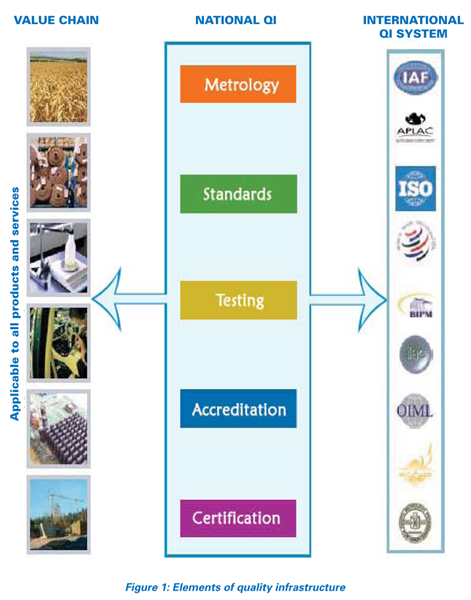Global trade agreements (such as the Economic Partnership Agreement (EPA) between the countries of the Caribbean Community (CARICOM) and the European Union (EU)), are guided by Agreements of the World Trade Organization (WTO). Most Member States (MSs) of CARICOM are signatories to the WTO Agreements. Membership of the WTO obliges adherence to the Multilateral Agreements including the Agreement on Sanitary and Phytosanitary Measures (SPS) and the Agreement on Technical Barriers to Trade (TBT), which are aimed at reducing the incidence of standards and regulations being used as barriers to trade. These TBT and SPS Agreements mandate that all technical requirements of signatories must be transparent, justifiable, non-discriminatory and should be based on international standards whenever possible.
With the reduction / elimination of tari-based barriers, standards are becoming increasingly important in further reducing TBTs. The WTO/TBT Agreement provides guidelines for the preparation, adoption and application of technical regulations, standards and conformity assessment, and encourages its members to adhere to the guidelines.
The realities and priorities in the Caribbean are different from those that obtain in the developed world. The relatively small size of Caribbean economies obliges the region to find ways of responding to the needs of the international market through functional cooperation, including the sharing of critical services and joint undertaking of key activities. This would enable them to reduce costs, and at the same time meet the necessary quality infrastructure (QI) requirements.

National Standards Bodies (NSBs) develop and promote standards at the national level and have to be supported by other components of an internationally-recognised quality infrastructure (QI) for standardisation, conformity assessment (including accreditation) and metrology, in order to satisfy global demands. These components of QI, necessary for bilateral and multilateral trade, are particularly important for developing countries that need to build and grow their production sectors. They also provide vital competitive advantage to the local businesses and firms.
International agreements support the notion that developing countries should apply international rules and standards in a manner that is within the capability of each Member State. The difficulty for developing countries and economies-in-transition is that most times they are not able to participate in the development of these rules and standards and so their views are not taken into consideration.
CROSQ in CARICOM
The State Parties (CARICOM Member States) established the CARICOM Regional Organisation for Standards and Quality (CROSQ) under Article 67 of the Revised Treaty of Chaguaramas that was signed by the Heads of Government of CARICOM on 5 July 2001.
Standards and Technical Regulations fall under Chapter Four of the Revised Treaty of Chaguaramas, specifically Part Three, which addresses Common Supportive Measures. The following is an excerpt from Article 67:
1. The Council for Trade and Economic Development (COTED) shall, in collaboration with competent agencies, develop a standardization programme in furtherance of the objectives of this Chapter and consistent with the international obligations of the Member States.
2. In implementing the programme, the Member States shall not use standards, technical regulations and conformity assessment procedures as barriers to trade.
3. The programme shall have the following objectives:
- trade facilitation;
- enhanced efficiency in the production and delivery of goods and services;
- improved quality of goods and services traded within the Community and with third States; and
- consumer and environmental protection.
4. The programme shall include the following elements:
- harmonisation of standards and technical regulations, and transparency in the development and promulgation of standards and technical regulations;
- recognition of conformity assessment procedures through mutual recognition agreements or other means;
- facilitation of standards infrastructure development at the national and regional levels;
- facilitation of metrology infrastructure development; and
- arrangements for the exchange of information with respect to development and implementation of standards and technical regulations among the parties to this Treaty
5. The Community shall promote the establishment of a regional standards body which shall, inter alia:
- facilitate implementation of the standardisation programme;
- assist the Member States in understanding and fulfilling their obligations under this Treaty and other international agreements;
- promote the development of national standards bodies in the Member States; and
- facilitate access to technical assistance available in the Member States and in third States.
The last statement (highlighted) is the basis for the establishment of CROSQ.
